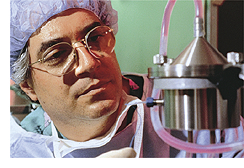![]() he
future belongs to those who prepare for it. This holds especially true
for academic institutions, where the ever-increasing competition for
federal funding will limit the number of outstanding medical schools
that will continue to be at the forefront of academic medicine.
he
future belongs to those who prepare for it. This holds especially true
for academic institutions, where the ever-increasing competition for
federal funding will limit the number of outstanding medical schools
that will continue to be at the forefront of academic medicine.
As a medical center with significant teaching and research components, our mandate is to do more than provide a level of care that can be found in any competent health care system. Our job is to make a difference in health care by translating new discoveries and therapeutic options from the laboratories to patients worldwide in the most efficient, rapid, and safe way possible.
 The development of outstanding translational and clinical
research programs will define the next level of patient care and assure
that the University
of Miami/Jackson Memorial Medical Center will be the place to go for
any patient in search of the most advanced treatments. A first-class research
enterprise not only will help the patient care mission of our school,
but
also will contribute to the UM teaching mission through access to outstanding
research programs and training opportunities for the next generations
of academic leaders.
The development of outstanding translational and clinical
research programs will define the next level of patient care and assure
that the University
of Miami/Jackson Memorial Medical Center will be the place to go for
any patient in search of the most advanced treatments. A first-class research
enterprise not only will help the patient care mission of our school,
but
also will contribute to the UM teaching mission through access to outstanding
research programs and training opportunities for the next generations
of academic leaders.
The strategy followed so successfully at the Diabetes
Research Institute represents a proven model for research success that
can be applied University-wide.
Over the years, investments have been made in the three key elements
needed for long-term research success: space, infrastructure, and people.
The
result has been a world-class institution with a demonstrated track record
of interdisciplinary collaboration in diabetes and a strong international
reputation for innovation and discovery.
 To repeat this formula school-wide, we as a medical
school will have to take careful aim at allocating our research investments
in a productive
and cost-effective way. This will require a hard look at the utilization
and efficiency of existing resources, an even harder look at school-wide
infrastructure needs, and a significant amount of resource consolidation
and interdepartmental cooperation.
To repeat this formula school-wide, we as a medical
school will have to take careful aim at allocating our research investments
in a productive
and cost-effective way. This will require a hard look at the utilization
and efficiency of existing resources, an even harder look at school-wide
infrastructure needs, and a significant amount of resource consolidation
and interdepartmental cooperation.
Progress already has been made by the former Executive Office of Research Leadership and by the Faculty Council’s research task force report on current needs, priorities, and challenges. But it takes money to bring in money, and a significant improvement in our research capabilities only can come about with funding—funding earmarked for the development of space and research infrastructure that will allow us to recruit additional world-class researchers in areas that are key to our strategic plan. Clearly our comprehensive campaign is critical to our sustained leadership as a medical research enterprise.
Then it will be the responsibility of individual departments, centers, and program directors to define the objectives and strategies that will move their units to the next level. They will not only set specific measurable goals that relate to the broader University objectives, but also they will be charged with setting these in motion and supervising faculty members and their overall and individual progress. Success is easily distinguishable from failure or mediocrity, and it’s easy to tell if you are going in the right direction.
The institutions with the strongest infrastructure, the most advanced biotechnology, and the best record of swiftly translating scientific discoveries into new treatments for patients will constitute the vanguard of modern medicine, and the University of Miami will be among them leading the way for decades to come.
UM MEDICINE HOME | UM MEDICINE ARCHIVE